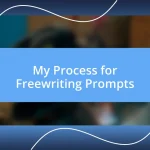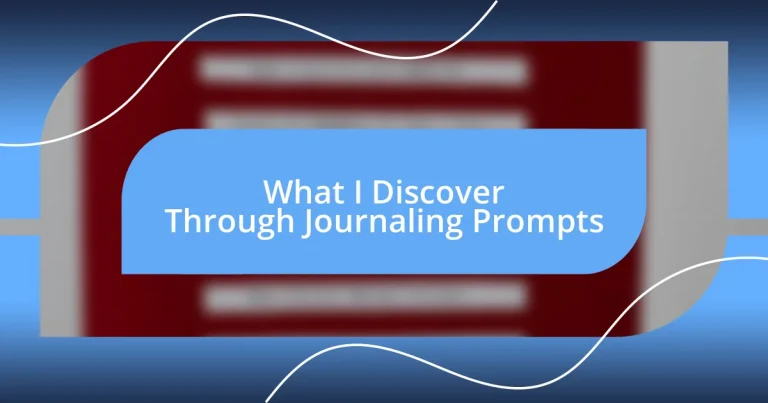Key takeaways:
- Journaling prompts encourage self-reflection and creativity, helping to uncover deeper thoughts and emotions.
- Different types of prompts, such as reflective, creative, and goal-oriented, cater to various aspects of personal growth and understanding.
- Engaging with journaling techniques, like setting a timer and integrating sensory details, enhances the writing experience and allows for meaningful insights.
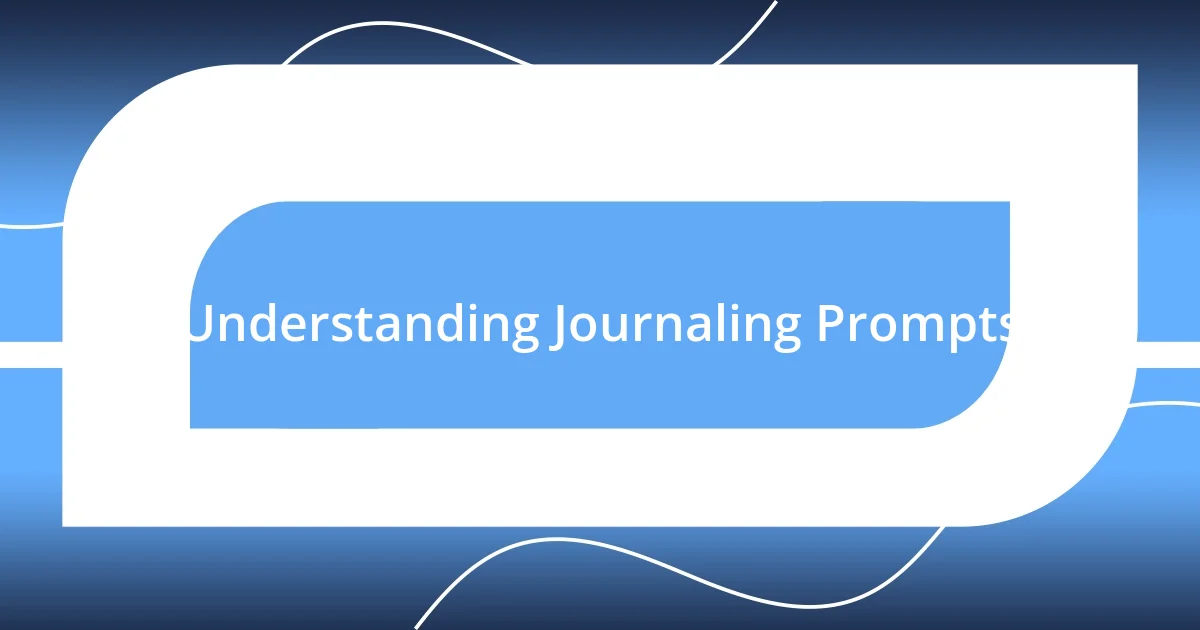
Understanding Journaling Prompts
Journaling prompts serve as gentle nudge for self-reflection and creativity. I remember the first time I encountered a prompt asking, “What would you do today if you weren’t afraid?” It pulled me out of my comfort zone, forcing me to confront my fears head-on. It’s amazing to see how a simple question can uncover layers of thoughts and emotions we often overlook.
Understanding journaling prompts means recognizing their potential to guide our thoughts. They aren’t just questions; they’re invitations to dive deeper into our inner landscapes. When I came across a prompt about gratitude, it made me realize I often take small joys for granted. Reflecting on that helped me appreciate the everyday moments that fill my life with meaning.
At their core, journaling prompts are tools for introspection, acting as mirrors reflecting back our aspirations, regrets, and desires. I often ask myself, “What do I truly want to accomplish this year?” The clarity that arises from such questions can be enlightening, driving me to set intentions that align with my true self. Have you ever noticed how the act of writing can transform confusion into clarity?

Benefits of Using Prompts
Using journaling prompts can bring clarity and direction to your thoughts in a way that feels almost magical. I remember a time when a simple prompt about my biggest strengths led me down a surprising path of self-discovery. It illuminated aspects of my personality that I had overlooked, and I realized how often I downplayed my accomplishments. It was a refreshing, empowering experience that uplifted my spirit and encouraged me to embrace my skills confidently.
The benefits of journaling prompts are not just personal; they can enhance creativity and foster emotional healing. When engaged with thoughtfully, these prompts can:
- Spark new ideas and creative solutions in various aspects of life.
- Encourage a deeper understanding of emotions, leading to mental clarity.
- Assist in breaking through writer’s block or creative stagnation.
- Serve as a safe space to express and process difficult feelings.
- Nurture self-compassion and reinforce positive self-talk.
I find this process incredibly rewarding; it’s like peeling an onion to uncover nuanced layers I never knew existed. Each prompt feels like a tiny invitation to explore a different part of my identity and life experiences.
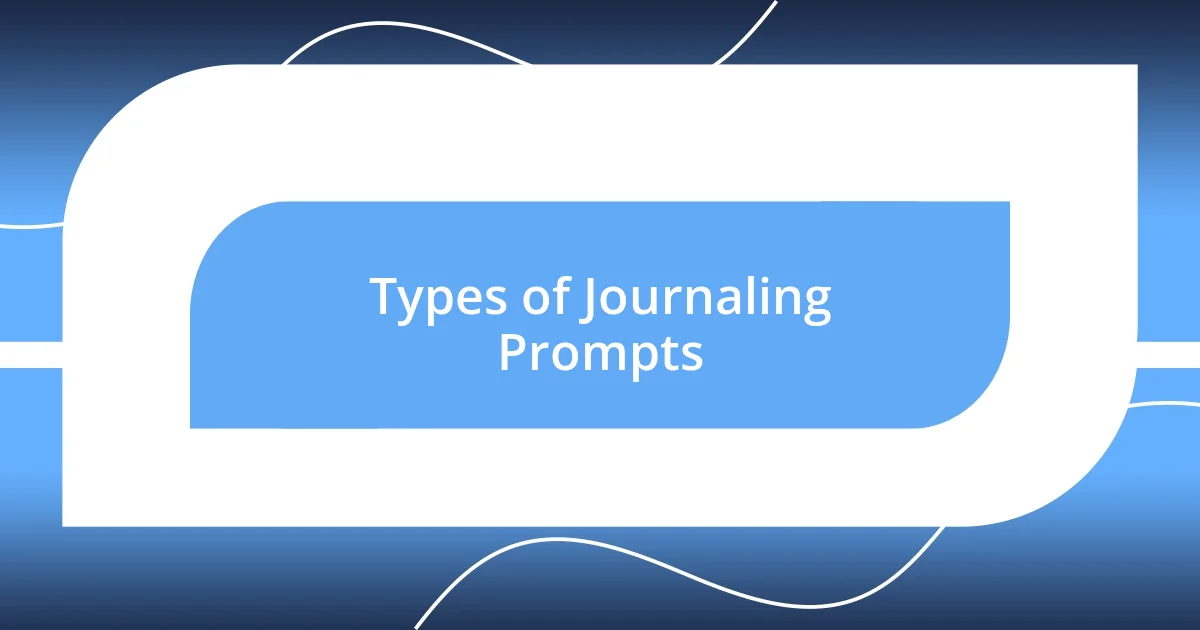
Types of Journaling Prompts
When it comes to journaling prompts, there are various types that cater to different aspects of self-reflection. For instance, there are reflective prompts that encourage you to think back on your experiences, like “What was the best decision you made last year?” I’ve found that revisiting past choices helps me understand my growth over time. It’s fascinating how our perceptions can evolve as we gain new perspectives.
Then, we have creative prompts that invite you to explore your imagination, such as “Describe your ideal day.” I recall daydreaming while writing about a perfect day, which unexpectedly ignited my creativity. Sometimes, the seemingly simple act of imagining can lead to actionable insights about what truly makes us feel alive.
Lastly, there are goal-oriented prompts that focus on future aspirations. Prompts like “What are three goals I want to achieve this month?” push me towards actionable reflections. They not only clarify my intentions but also motivate me to create steps toward those aspirations, making the journey feel more achievable.
| Type of Prompt | Description |
|---|---|
| Reflective | Prompts that guide you to reflect on past experiences and choices. |
| Creative | Prompts that stimulate imagination and encourage creative thinking. |
| Goal-Oriented | Prompts focused on setting and achieving future objectives. |

How to Choose Prompts
Choosing the right journaling prompts can feel a bit daunting, but I’ve learned that it’s all about tuning into what resonates personally with you. For instance, I once stumbled upon a prompt about gratitude while feeling particularly low. It ended up shifting my entire perspective, revealing blessings I hadn’t acknowledged in a while. This taught me to select prompts that speak to my current emotions or challenges.
I also find that experimenting with different types of prompts can lead to unexpected insights. One time, I chose a creative prompt around nature while taking a walk outside. As I reflected on the beauty around me, my thoughts flowed freely, resulting in a vivid narrative that I didn’t know I had within me. Have you ever thought about how a change of scenery or mood can influence your writing? I believe it’s crucial to be flexible and responsive to what you’re feeling or curious about at the moment.
Ultimately, selecting prompts that challenge and inspire you can open doors to deeper understanding and personal growth. I usually ask myself, “What do I genuinely want to explore today?” This simple question has guided me toward prompts that resonate and provoke thought, turning each journaling session into a meaningful journey. Engaging with prompts in this way truly makes the experience fulfilling and insightful.
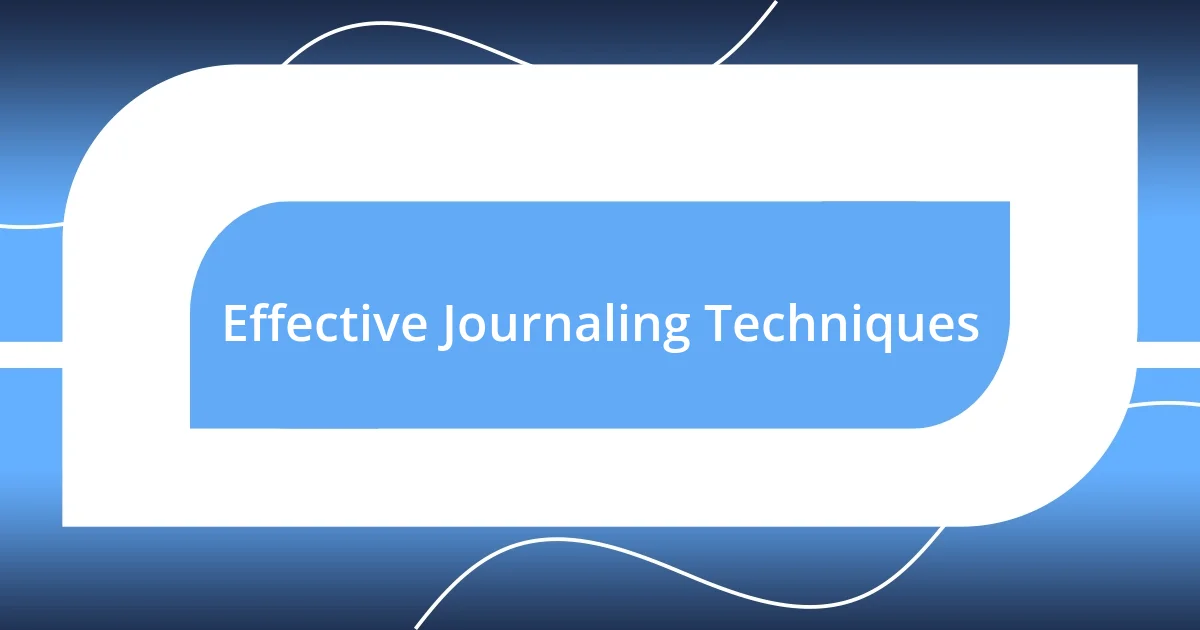
Effective Journaling Techniques
Effective journaling techniques can significantly enhance your reflective practice. One method I’ve found particularly helpful is setting a timer for 10-15 minutes. I remember the first time I tried this; I felt an initial urge to rush but soon realized that slowing down allowed my thoughts to deepen and my emotions to surface. Have you ever felt that your best ideas come when you give yourself the time to think? It’s amazing how often insights can emerge when we don’t pressure ourselves to fill the page instantly.
Another technique that transforms my journaling experience is incorporating sensory details into my entries. Instead of just stating facts, I strive to paint a picture with words. For example, describing the warmth of the sun on my skin or the scent of fresh coffee brings my reflections to life. This practice turns mundane moments into rich narratives, reminding me that even small experiences can carry significant meaning. Don’t you agree that the more vividly we express our thoughts, the more impactful they become?
Lastly, I often revisit previous entries to track my growth over time. A few months ago, I stumbled upon an old journal entry filled with worries that seemed overwhelming back then. Reading it now, I could hardly believe how far I’ve come. This realization sparked a sense of gratitude and renewed outlook on current challenges. How often do we pause to celebrate our progress? I encourage you to take a moment to look back—it can be incredibly empowering and insightful to witness your journey unfold on the pages.
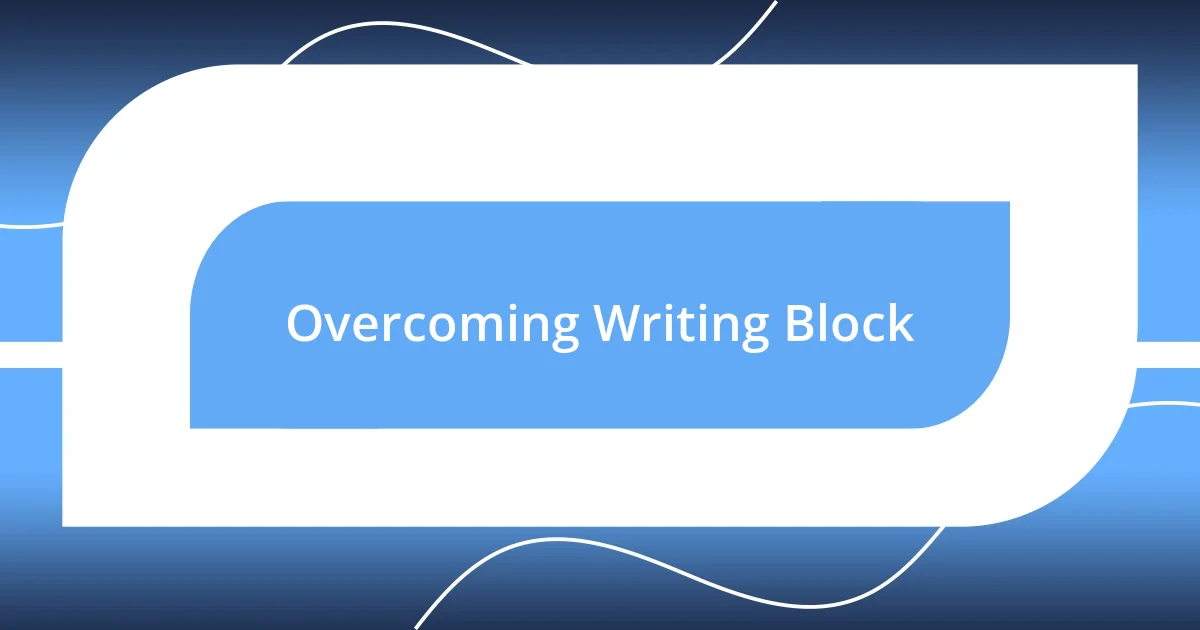
Overcoming Writing Block
Writing block can be one of the most frustrating experiences for any journaler. I recall a particularly dry spell where I’d sit with a pen in hand, staring at a blank page, feeling stifled. It got me thinking, “What if I just wrote down my frustration?” Surprisingly, that simple act became a catalyst, leading me to explore the root of my writer’s block and ultimately finding inspiration in unexpected places.
Sometimes, I find that shifting my focus helps break the chains of writer’s block. During a creative lull, I decided to write about something mundane that had happened that day—picking up groceries. As I described each item—a ripe avocado, a loaf of crusty bread—I found myself weaving a narrative filled with memories attached to those objects. Have you ever noticed how detailing the ordinary can reveal extraordinary stories? It’s a reminder that inspiration is present in every corner of our lives, just waiting for us to notice it.
Another effective approach I’ve learned is to allow myself to write badly. Once, I set aside a journaling session just to scribble out my “worst” writing. I chuckled as I penned ridiculous phrases, but what happened next was magical—it freed me from the pressure of perfection. It’s important to ask yourself, “What if my unpolished thoughts hold the key to creativity?” This unleashed a flood of ideas that I later refined, proving that permission to be imperfect can often lead to breakthroughs.

Reflecting on Your Discoveries
When I reflect on my journaling discoveries, I often find surprising nuggets of wisdom waiting to be unearthed. Just last week, while going through my journal, I came across a page filled with thoughts about a stressful week. What struck me most was how the frustrations I felt at the time had transformed into lessons about resilience and self-awareness. Isn’t it fascinating how our perspectives can shift, revealing strengths we didn’t even know we had?
Revisiting my entries allows me to trace the arc of my emotional journey. I remember reading about a time when I battled self-doubt. As I reflected, I realized that those entries were not just cathartic; they were an illuminating guide to understanding my triggers. Have you ever noticed how putting your thoughts on paper can turn chaos into clarity? It’s an empowering experience that reminds me that growth often comes from facing our challenges head-on.
Sometimes, looking back at my past writings brings a rush of nostalgia, reminding me of the small victories I’ve celebrated. A particular entry captured a moment so vividly that it transported me back in time, sparking a smile that I hadn’t expected. It’s these little moments of joy that reaffirm my commitment to journaling. How often do we let the simplicity of happiness slip by unnoticed? Reflecting on these experiences not only deepens my gratitude but also motivates me to keep exploring my inner landscape.







